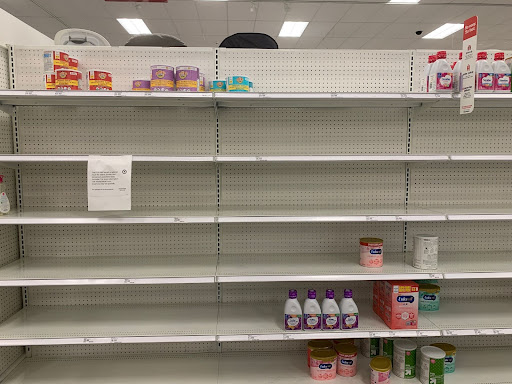
What Parents Can Do About the Formula Shortage
Is the formula shortage still going on? Here's what you should know if you're struggling to find baby formula.

By Tess Lynch

In This Article
Editor's Note: This article was originally published in 2022, when there was a formula shortage.
Although the worst of the formula shortage that started in February 2022 is said to be behind us, some parents say they're still feeling the impact. Supply of the formula you need may still be inconsistent, especially depending on the type of formula and your location. It can also leave you wondering if a formula shortage could happen again.
This puts parents who rely on formula—either wholly or in part—to feed their babies in a uniquely vulnerable position. But if you’re overwhelmed by it all, you’re not alone. This guide is here to support you through a challenging time.
What caused the formula shortage?
The combination of existing supply chain issues and the nation’s largest formula supplier, Abbott Nutrition, pausing production after a recall last February resulted in a challenging situation for parents, especially those with very young infants. The recalled products, which were all powdered formulas, included both regular and hypoallergenic/specialty varieties, had been linked to outbreaks of two strains of bacterial infections—Cronobacter and Salmonella—in four infants, resulting in two deaths. Production at the Abbot Facility in Michigan that was the source of the issues resumed in July.
I still can’t find my usual brand of formula, but others are available. Can I switch my baby’s formula?
Yes, in most cases, as long as you stick with the same type of formula (for instance, swapping one iron-fortified cow’s-milk-based brand for another). “Most babies do require time to adjust to a new formula,” says Katie Ferraro, the registered dietician behind @babyledweanteam. “Be prepared for a little more fussiness than usual, more gas or changes to the stool pattern or consistency. If you’ve used a brand name, it’s fine to switch to generic, or vice versa.”
Ferraro speaks from experience, too. “I am a mom of seven kids, all of who at one time relied on formula and while changes to formula brands or varieties can be a little rocky, most babies adjust quickly,” she says.
Of course, if your baby is on a specialized diet (such as a hypoallergenic formula), you’ll need to consult with your pediatrician before changing things up, and if you receive WIC, don’t forget to contact them about any formula substitutions to make sure it’s approved. And as always, keep an eye out for signs of constipation, vomiting or other symptoms of dietary distress and make sure you keep your pediatrician in the loop.
I saw a recipe card from the ‘60s circulating online that outlined how to make homemade baby formula. Should I make my own formula?
No. Pediatricians strongly advise against making your own formula, citing dangers such as contamination, water intoxication and even cardiac arrest. “Replicating the nutrient intricacies of human milk is an exact science,” Ferraro says. “The risk for potential contamination or suboptimal nutrient intake is too great for the fragile, developing infant body and brain.”
So if you see formula recipes floating around on your Instagram feed, resist the temptation to try it yourself.
I got lucky and found a store that still has plenty of the formula I need. Should I stockpile what I can while I have the chance?
No. Formula hoarding has worsened the situation considerably, and some unscrupulous sellers are engaging in price gouging. Children with special dietary needs or severe allergies are particularly at risk due to the shortage, so a much better option would be to donate any extra formula you come across to a hospital or shelter where it can be distributed to families in need.
Dr. Mona Amin from Peds Doc Talk recommends maintaining a two week supply if possible, and also issues a reminder to avoid buying specialized formula as a replacement for your usual formula to avoid worsening the shortage for children with special dietary needs.
I’m open to trying another brand, but I can’t find ANY formula in stock. What options do I have?
The American Academy of Pediatrics (AAP) has a list of alternative formula resources if your local groceries and pharmacies have been cleaned out. But here are other places you can look:
Your pediatrician: They may be able to offer sample cans or connect you with formula representatives.
Smaller retailers: You may have luck with independently owned pharmacies or locally owned grocery stores.
Reputable online distributors: If you can’t find formula in physical stores, look to Target, Sam’s Club, Thrive Market, and others major retailers.
Social media groups: A local parents’ group can connect with people who have formula they don’t need, or those who know of retailers that have formula in stock. Baby Formula Search and Swap is one such group where parents have been helping each other source formula when they're having trouble.
Milk banks: If you’re open to using donor breast milk, this may be worth exploring.
International retailers: This may be an option if you can find a reputable source or have a family member or friend overseas who can ship to you, although that may be cost-prohibitive.
Find My Baby Formula App: Built by a programmer and new dad who was struggling to find formula for his son, Find My Baby Formula is a free app that sends you push notifications when the formula you need comes back in stock at the store(s) of your choice.
If you’ve seen cow’s milk recommended as a temporary formula replacement for infants over six months, you should be aware that it’s best saved for emergencies, after other options have been exhausted. “While it is safe for babies age [six months and up] to consume cow’s milk protein in foods like yogurt or as ingredients in other foods, fluid cow’s milk is not an acceptable alternative for breast milk and/or commercial infant formula,” Ferraro says, and this replacement “should be a last resort (although certainly more preferable than watering down formula!).” If you’re considering doing something like this, your first step should be looping in your child’s pediatrician to advise.
I have some formula left, but I’m worried it’s not enough. Should I dilute it by watering it down?
No. Diluting infant formula can have disastrous consequences. However, if your baby is ready to start solids, this may be a great time to add supplemental chewable nutrition to their diet.
This is awful! And stressful! When will the formula shortage end?
Agreed! By six months of age, most babies’ diets include at least some formula, so the impact of this crisis has been considerable. The good news is, the situation is improving. During the peak of the shortage, 40% of formulas were out of stock, but as of November 2022, around 12.5% were unavailable, according to a report by the 19th News.
The shuttered Abbot Nutrition facility reopened and resumed production in July. And last year, the government took measures to help alleviate the shortage: the Food and Drug Administration (FDA) eased guidance on formula imported from overseas, and the Biden administration invoked the Defense Production Act, in order to prioritize production of infant formula.
While the situation is looking better, the FDA says there's still progress to be made. “We recognize that while infant formula supplies are improving, there are still parents struggling to find formula or find their specific type of formula on store shelves," an FDA spokesperson told CNN. "We continue to do everything we can to make sure parents can get safe and nutritious infant formula whenever and wherever they need it."
If you're still struggling to find the formula you need for your baby, we're here for you. This guide tells you how to change switch baby formula if you can't find what you're looking for. And remember: you're not alone.
